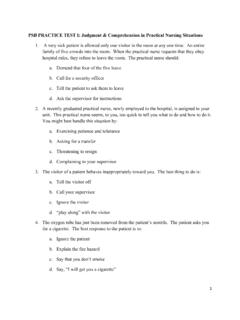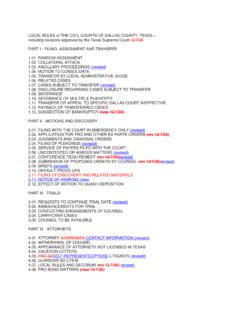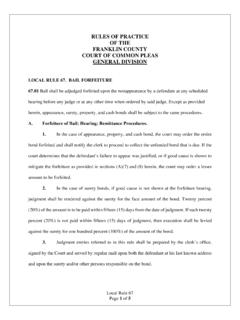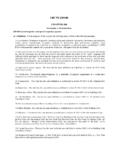Transcription of The Principal Fiduciary Duties of Boards of Directors …
1 The Principal Fiduciary Duties of Boards of DirectorsPresentation at Third Asian Roundtable on Corporate GovernanceSingapore, 4 April 2001 Professor Bernard S. BlackStanford Law want to offer an overview of the Principal Fiduciary Duties of Boards of Directors . I will speak mostly from a common law perspective. Fiduciary Duties of Directors were firstelaborated by common law judges, operating without any guidance from the formal writtenlaw. Indeed, the company laws of the United States, and many other common lawjurisdictions, contain no statement at all of the core Fiduciary Duties of care and loyalty. Thefiduciary Duties of Directors are continuing to evolve, again without formal written classic statement, still found in many American law school textbooks, is thatdirectors owe to shareholders, or perhaps to the corporation, two basic Fiduciary Duties : theduty of loyalty and the duty of care.
2 I believe that this is too simple a picture. There are atleast two additional core Duties that Directors have today: a duty of disclosure, and a dutythat has no precise name, that I will call the duty of extra care when your company is atakeover want to offer, for each of these Duties , a brief statement of the duty, why it exists;and how the duty is enforced or, sometimes, not enforced. I will speak about Duties ofdirectors, but these Duties apply to officers for Whether Duty isMetRemedyloyaltyfair process (approval bynoninterested Directors ) orelse burden on Directors toshow entire fairnessinjunction or damagescarebusiness judgment rulenone, except in very extremecases. In , charter caneliminate liability outsidedirectors for breachdisclosuredisclose all materialinformation when seekingshareholder approval, orwhen a conflict of interestexistscorrective disclosure ordamagesextra care when sellingcompanyno clear test; careful scrutinyof decision processinjunction or damagesDuty of LoyaltyThe most important Fiduciary duty is the duty of loyalty.
3 The concept is simple: thedecision makers within the company should act in the interests of the company, and not intheir own interests. The easiest way to comply with this duty is not to engage in transactionsthat involve a conflict of interest. We often call these "self-dealing" transactions. Theconcept is that the Directors are dealing with themselves, and may not reach an agreementthat is fair to the company. An alternative, that is accepted in most countries because a flatban on self-dealing transactions can be impractical, especially for smaller firms, is to have3self-dealing transactions approved by a noninterested decision maker. That decision makercan be noninterested Directors , noninterested shareholders, or sometimes both. In the United States, if a conflict-of-interest transaction is negotiated and approvedby the noninterested Directors , in a manner that approximates arms-length negotiations,including the right of the noninterested Directors to reject the transaction altogether, thetransaction is accepted unless a shareholder proves in court that the transaction is not entirelyfair to the company.
4 The burden is on the shareholder to show lack of entire fairness. Otherwise, the transaction is considered invalid if challenged, unless the Directors prove incourt that the transaction is entirely fair to the company. The burden is on the Directors toshow entire the usual case where a range of prices can be considered fair, this shift in theburden of proof has large consequences in practice. Most public companies prefer to obtainapproval by noninterested Directors , rather than face the challenge of proving entire fairnessin court. The most common remedy is damages. The courts are very cautious aboutunwinding a long-completed transaction, and will almost never do so if there is a risk ofharm to a third party who has acted in good companies, in the common case where the company has a majority ofindependent Directors , almost always rely on noninterested Directors to negotiate and approvea conflict-of-interest transaction.
5 Partly this is because of the legal consequences I have4described. Also, if the independent Directors allow interested Directors to vote to approve aself-dealing transaction, this is likely to lead to public criticism of the independent Directors ,as well as a lawsuit that they are likely to lose, where the Principal question is the amount ofdamages. Even if the damages will be paid by the company rather than by the Directors , fewdirectors want to accept this sort of public my opinion, the Principal value of independent Directors lies in more carefulreview of conflict-of-interest transactions. The independent Directors will not often help thecompany to make better business decisions. One can debate how many independent directorsis enough. Indeed, in a paper written with Sanjai Bhagat, titled Board Independence andLong-Term Firm Performance,1 which can be downloaded from the Social Science ResearchNetwork internet site at , we find no evidence in the United States thatcompanies with a higher proportion of independent Directors perform better than companieswith a lower proportion of independent Directors .
6 But no one doubts that having someindependent Directors is important, and that a core task for the independent Directors is toreview proposed self-dealing transactions. These Directors , especially if they are supportedby strong accounting disclosure rules, by a strong financial press that can report misdeedsand embarrass Directors into behaving well, and by liability rules that expose Directors to 1 Sanjai Bhagat & Bernard Black, Board Independence and Long-Term Performance (working paper2000), available at liability if can approve transactions that are grossly unfair to minority shareholders,can help to ensure that the company s profits are shared more equally by inside and want to stress that the rules that work reasonably well in the United States may notwork as well in other countries.
7 Many countries have a weaker tradition of independentdirectors, greater cultural tolerance for conflict-of-interest transactions, and judges who areless willing to review transactions to determine whether they are in fact fair to minorityshareholders. In these countries, review by independent Directors , and the possibility of laterreview by a judge, may provide too little protection to minority shareholders. It may beimportant to also require approval by noninterested shareholders, or other proceduresdesigned to limit the extent of broadly, effective protection against self-dealing requires a complex networkof institutions, of which review by independent Directors is only one element. There is a realdanger, in a conference like this, that we will pay too much attention to the role of the boardof Directors in reviewing self-dealing transactions, and too little attention to other importantinstitutions.
8 I review these other institutions in a recent article on The Legal and InstitutionalPreconditions for Strong Securities Markets, that is also available through the internet 2 Bernard Black, The Legal and Institutional Preconditions for Strong Securities Markets, 48 UCLALaw Review 781-858 (2001), available at of CareThe second core duty of Directors , in situations where they do not have a conflict ofinterest, is the duty of care -- the duty to pay attention and to try to make good decisions. Ioften encounter surprise about how little the duty of care requires the Directors to do. Theydo not have to make sensible decisions. They only have to show up, pay attention, and makea decision that is not completely courts simply do not hold Directors liable for business decisions, madewithout a conflict of interest, unless those decisions are completely irrational.
9 The doctrineof noninterference is known as the business judgment rule. It has several justifications. First, courts are bad at second-guessing in hindsight decisions that turned out poorly. Second, an investment in a business can turn out badly, for a whole host of reasons. Badmanagement decisions are only one of these reasons. They are a risk that shareholdersknowingly assume. Third, some risky decisions will work out wonderfully, while others willwork out terribly. If the Directors risk being found personally liable for bad outcomes, theywill be reluctant to take risks, and we will get fewer really good decisions also. We may notget better decisions on average, just more cautious business judgment rule can be understood more easily if we look at the multipleconstraints that lead most company managers, most of the time, to work hard at their If constraints like product market competition, and the market for corporate control, and themanagerial labor market, and incentive compensation, and managerial culture, and thestatement in the company law that Directors are supposed to try hard, directed at responsibleadults who try to do their jobs, taken together, do a pretty good job of motivating directorsto try reasonably hard, and second-guessing can chill risk-taking, then it can make sense toinstruct judges not to second-guess even decisions that they think are truly favorite story, when I explain the business judgment rule in transition countries.
10 Where lawyers often believe that Directors should be liable for bad decisions, goes like this. Imagine a company whose business strategy consists of, this year, spending $10 billion tobuild several new factories, to sell products they haven t yet developed, to customers theydon t yet have. The strategy will succeed only if the market grows by at least 30% this year,and if their engineers can turn plans for new products into real products on time. If theysucceed, they will do the same thing next year, only on a larger scale. If they fail, thefactories will sit idle, and the equipment in them will be obsolete within five years. The chiefexecutive officer of the company has been quoted in the business press, where he describesthis strategy as being like driving a car at 150 kilometers per hour, along a winding mountainroad, in the dark, with the lights out, trying not to strategy is guaranteed to crash, sooner or later.
















